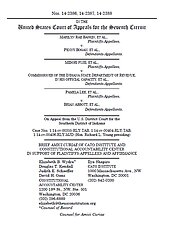Baskin v. Bogan, Fujii v. Commissioner of Revenue, and Lee v. Abbott
Learn more about Cato’s Amicus Briefs Program.
Having filed amicus curiae briefs in Hollingsworth v. Perry (California’s Prop 8), United States v. Windsor (Defense of Marriage Act), and the cases involving the marriage laws of Oklahoma, Utah, Virginia, Michigan, Tennessee, and Kentucky, in the U.S. Courts of Appeals for the Tenth, Fourth, and Sixth Circuits, respectively and chronologically, Cato and the Constitutional Accountability Center have filed a jointbrief in three marriage-related cases out of Indiana that are now before the Seventh Circuit. These cases, which are consolidated for oral argument with another case out Wisconsin, seek the right to marry for same-sex couples and the recognition of marriages entered into by same-sex couples in other jurisdictions. The Cato-CAC position continues to be what we’ve argued all along: The Fourteenth Amendment promises the equal protection of the laws to all persons. It’s a sweeping guarantee that eliminates class-based discrimination that lack a strong policy justification (for example, denying driver’s licenses to blind people). Though enacted in response to failures to protect the rights of the newly freed slaves, this guarantee was intended to protect the rights of all persons—as demonstrated textually by its neutral phrasing, extending its protections to “any person.” The amendment’s proponents consciously rejected race-specific language. Indeed, in introducing the amendment, Senator Jacob Howard explained that it “abolish[ed] all class legislation.” The common, public understanding was that the Fourteenth Amendment “[took] from the States the power to make class legislation and to create inequality among their people.” Both early Supreme Court cases and modern precedent demonstrate that it was understood that the Equal Protection Clause spoke in general terms that were considered comprehensive. The equal right to marry the person of one’s choice is guaranteed by that provision. Even opponents of the Fourteenth Amendment acknowledged the fundamental nature of the right to marry. The modern Supreme Court has recognized this as well, most famously in Loving v. Virginia, as well as in Zablocki v. Redhail and elsewhere. Laws that prohibit or refuse to recognize same-sex couples’ marriages therefore violate the constitutional guarantee of equal protection of the laws. They impose badges of inferiority on persons based solely on their class and harms extend to the children being raised by such couples. No compelling state interest is served by and no constitutionally legitimate rationale can be found in such disparate treatment. Merely invoking “tradition” can’t save a practice from constitutional prohibition—as has been shown in cases involving segregation, sodomy, and speech restrictions. The very purpose of the Fourteenth Amendment was to break the tradition of denying the equal protection of the laws to newly freed slaves and other disfavored groups.

This work is licensed under a Creative Commons Attribution-NonCommercial-ShareAlike 4.0 International License.


